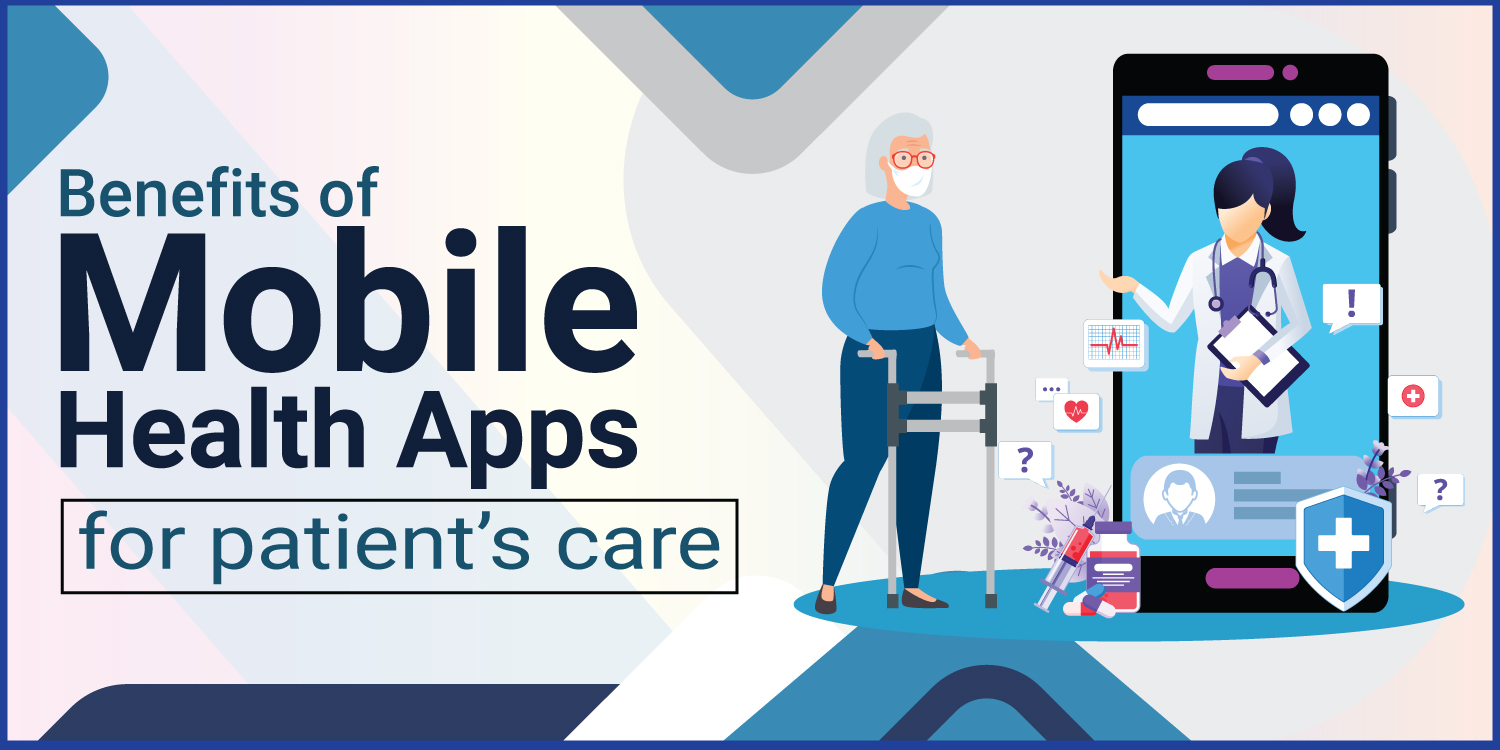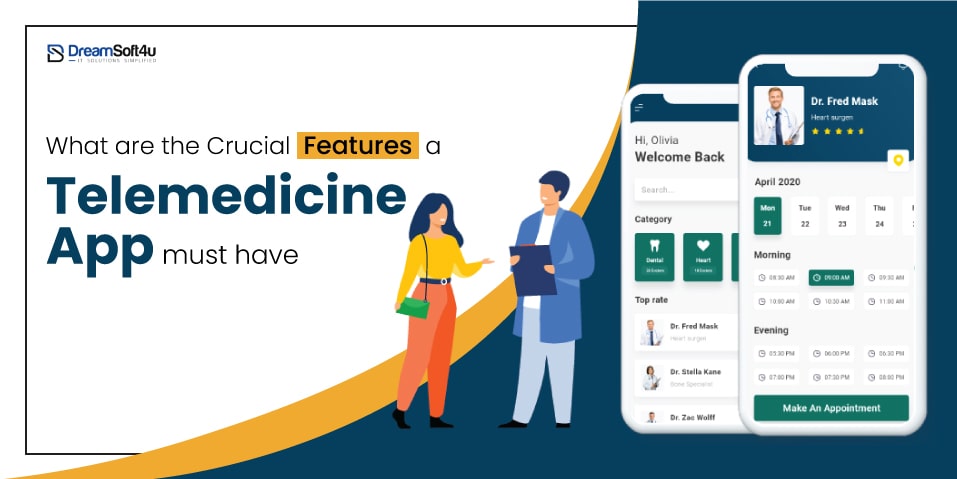Every industry is now being reshaped by the mobile revolution, and the healthcare industry is a great example to understand. Mobile health apps have completely revolutionized how healthcare services were offered a few years ago. Everything from online appointments with doctors, e-prescriptions, and billing to reports can be done online without any physical interactions, which is suitable for both patients and healthcare professionals to deliver their services more efficiently and be able to care for more patients.
As per the stats, the global mHealth market is expected to reach $269.31 billion by 2032 with a CAGR of 12.3%. It clearly shows how fast the healthcare market is shifting towards mobile and makes it a convenient option.
Compared to a few years ago when everything needed to be taken care of manually, digitalization now makes various things possible. This shift will continuously grow, and that’s the main reason why healthcare companies are considering delivering their services via apps to reach broadly.
However, many healthcare businesses are not aware of the true potential of mobile apps and how they can change the healthcare industry. Don’t worry!
Here, we have handpicked the top 10 benefits of mobile health apps for patient care and why every healthcare business needs apps for its growth.
Table of Contents
ToggleWhat Is An mHealth App?
There’s no right or wrong description to state the unmistakable sense of mHealth applications, as said by WHO( World Health Organization). But a general meaning countries that “ mHealth app development is just like other operations being on Google play store or Apple store. These apps support medical treatment and public health practices via smartphones, patient monitoring widgets,etc. ”
So speaking off, any app related to fitness, health measures, and connectable with wearable bias is considered a mHealth app. also, any health- acquainted magazine represented to the native mobile interface is also under the marquee of mobile health apps. So, these were the quick delineations of mobile health technology and related operations. Now, we’re going to learn the benefits of mobile health apps.
Advantages of Healthcare mobile apps for patients
Here are benefits of mobile health apps that make patient care easier.
1. Managing health records
In the healthcare sector, managing patient records is a critical step. Patients can hold their curing records using smartphone applications. These reports help to access medical information with only one touch, which saves doctors time and gives them enough time as apps reduce their physical presence in looking for files and paperwork relating to the clinical history of the patient.
2. Improved Coordination
Doctors and hospital personnel can conveniently communicate with patients using a personalized smartphone app. It can also streamline the process inside the same premises among numerous offices, laboratories, and employees.
Doctors can express the prognosis to the patients personally and administer necessary drugs. The app will alert physicians and patients of the forthcoming visit and will notify hospital personnel if the condition needs any reports/documents.
The app will provide updates on the current condition of the patient for nurses and other personnel, and notify them if any prescriptions are due.
3. Patient Vital Stats Monitor
Another mobility solution that would be of great use is that of providing the vital statistics of the patient. With technologies like the internet of things (iot) making new strides, new devices known as Internet of Medical Things (IoMT) are going to make their presence. These devices would provide a live stream of IoT Data Visualization (IoT data viz) patient generated health data (PGHD) to a central server and this would be made available to doctors and nurses through a mhealth apps.
Offering the patient’s vital information is another mobility option that can be of tremendous benefit. New devices are known as the internet of medical things, IoT will make their appearance with technology such as the internet of things (IoT) making new strides. This system will have a live feed to a central server of IoT data viz. patient-generated health data (PGHD) and this would be made accessible via a smartphone application for doctors and nurses.
4. Reduces the Risks of Wrong Diagnosis
We heard a number of cases during the earlier days where patients have had to risk their life because of a diagnostic method mistake. But all those possibilities that have been life-threatening for any patient have been nullified by healthcare implementations.
Since physicians get an accurate report of the health status of the patient, it allows them to administer the most accurate medication with the proper dose and chemical composition. With cloud facilities, they can also store the patient’s records.
Also, medical personnel can more effectively keep patient records and enter vital details without making any errors.
5. Enhanced Patient Engagement
There are mobile applications that put all patient knowledge, from previous medical records to success indicators, patient reviews, changes in care habits, and scheduling, to consider and make a decision about moving on at the click of a button on the smartphone application for medical professionals. Because all information is captured in real-time, it makes it easier for doctors to adjust changes without having to describe the patient’s condition in person to the next doctor. The smartphone application has all the information needed by managers or nurses.
6. Enabling Immediate Access to Care
The days that doctors used to make an in-home appointment to diagnose and treat patients are gone. Today, digital visits have been replaced by in-home visits. Through the advancement of healthcare smartphone applications such as Doctor on Call, patients can find a top doctor nearby easily and book an appointment or audio/video chat in a matter of seconds. This way, in the event of an emergency, they can stop making a potentially risky visit to a hospital.
7. Reduced Risks of Diagnosis Error
You could be told of certain cases where patients are threatened in their life due to diagnosis errors. But in healthcare smartphone applications, this diagnostic mistake won’t take place. Doctors should obtain reliable descriptions of the clinical status of patients, even though hospital personnel can correctly maintain the detailed health of patients without error.
8. Securely Capture and Share Diagnostic Images
The signs of a patient are impossible to visualize purely on the basis of previous written medical reports. The solution to the issue of recording signs of physical patients is clear: a smartphone EHR app with image capture capabilities that can safely take pictures of anything from a simple skin rash to a complicated mark of injury.
During follow-up hospital appointments, most care practices rely on real photographs of the tissue region of a patient or accident signs for reference purposes, and smartphone EHR applications are the best way to collect real images.
9. Faster Payments
No one has patience in a hospital to wait in line to make payments. And still, in virtually every hospital, it’s a typical scenario. A relative or a close friend is often seen struggling to pay the bills for his turn as the patient struggles helplessly to get the medical treatment he wants.
Apps for hospitals also strip away this hassle. Faster payment and prompt service are facilitated through electronic payment services such as payment by card or digital wallet. Online banking also aims to promote stable and quick payments.
10. Enhanced Data Management
It’s obvious to know that healthcare organizations have a very large amount of data that includes sensitive information about their patients that need to be managed carefully. A modern problem has a modern solution i.e, Electronic Health Records (EHRs). It’s a standard framework that comes in the mobile application, which helps organizations store and manage sensitive data in a secured and standard format.
Want to develop mHealth app for your business?
Connect with our Professional developers
Top 5 Best Healthcare Mobile Apps In The Market
Here are the top five real-world examples of healthcare mobile apps:
1. PatientKeeper: This app is specially designed for healthcare organizations to allow them to order labs, medications, radiology, and other services across numerous hospital departments.
2. MyEpilepsy: It’s a free educational app that enables clinicians and patients to manage epilepsy effectively.
3. NEJM This Week: This app keeps patients informed about the latest developments happening in the medical world.
4. CarePassport: It allows patients to access medical data such as images, lab results, and clinical reports from different healthcare professionals and encourages patients to manage their health.
5. Epocrates: An app which is used for looking at information about the availability of prescription drugs for treating particular conditions and their effects.
Conclusion
Overall, mobile health apps have huge potential and scope in the future of the healthcare industry. Its demand will grow over time, and most of the possible healthcare professional services will be delivered via app to make it convenient for both healthcare professionals and patients. A mobile app can offer numerous healthcare services, including online video consultation, e-prescription, online billing, easy-to-access and manage patients’ records, 24/7 support, tracking the progress of patients, and providing education resources to patients for better care. The rapid growth of mHealth apps is a sign that it’s time for healthcare organizations to invest in mobile app development to deliver their medical services and improve their patient care.
So, if you are ready to build your healthcare mobile app, then our experts are ready to understand your requirements and come up with cost-effective solutions. Connect for a free consultation today!
FAQs
Q1. What is the purpose of healthcare apps?
The main purpose of the healthcare app is to deliver various healthcare services, including online appointments, e-prescription, eBilling, faster communication, and tracking progress.
Q2. What are the key features of the health app?
Some of the key features healthcare apps include are online appointments, symptom checkers, medicine reminders, storing and managing patients’ records, and progress tracking.
Q3. How to launch a health app?
The fastest way to launch your health app is by hiring a professional healthcare app development company, sharing your requirements, and letting the professionals deliver a feature-rich app for your healthcare organization.
Q4. Is the Health app safe to use?
Yes, these healthcare apps store various sensitive information about patients, and that’s why these apps are designed to protect with HIPAA-compliant security measures.



















